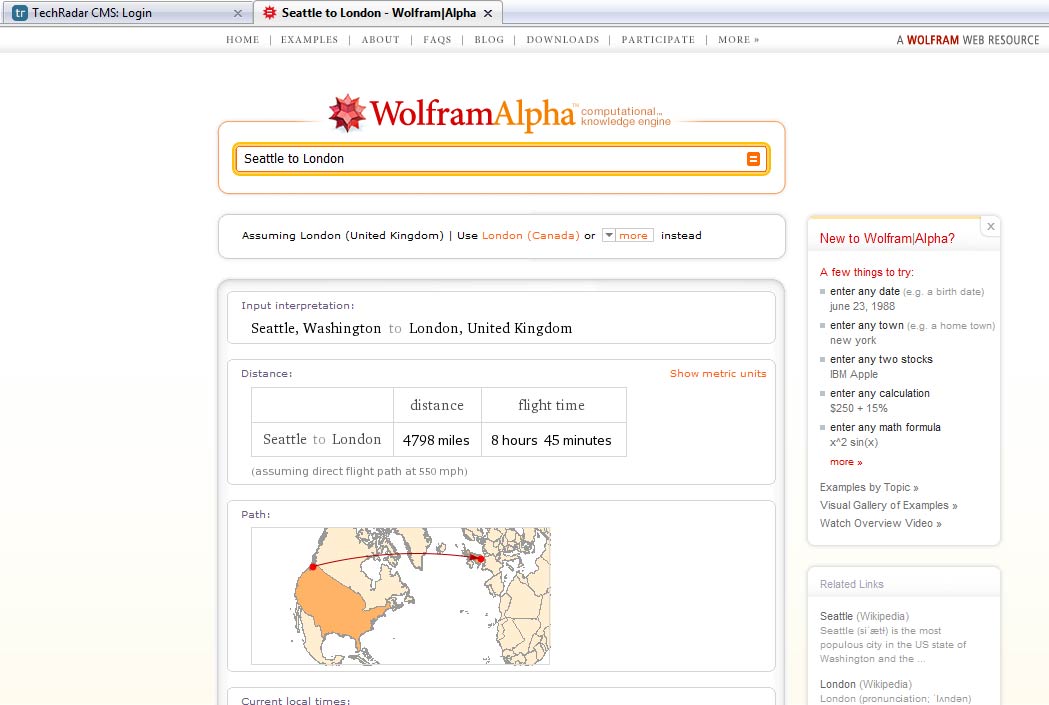Why Wolfram Alpha is bad news for the web
Google Squared and Rich Snippets aren't helping, either

If you've been watching the latest announcements from the world of search you'll know that there's a new search engine in town, Wolfram Alpha, which takes your questions and attempts to answer them with charts and tables.
You'll also know that Google's adding yet more goodies in the form of Rich Snippets - bits of code in web pages that provide Google with a précis of the page contents - and Google Squared, which attempts to do much the same as Wolfram Alpha. It's all very clever, and deeply worrying.
There's no doubt that search engines are getting smarter, which is generally a good thing. However, they're guilty of something called Mission Creep: that is, they're doing more and more work. In the good old days search engines were facilitators, dumb actors that didn't actually know anything but knew where you could find what you needed.
Now, they're attempting to be oracles. Instead of showing you where to find the answer, they want to tell you the answer; instead of taking you to the right destination, they want to *be* the destination. That's an important difference, and it's bad news for webmasters.
Take Google, for example. The other night we searched for a single word: Eurovision. We wanted to know who won, and the answer was right there at the top of the results page because Google has integrated news results into its main search. When we want to know a phone number or address, we just stick it in the search box and up it comes, courtesy of Google Maps.
When we want to define a word, know what time it is in California, check the weather forecast… you get the idea.
Search engine or Oracle?
Sign up for breaking news, reviews, opinion, top tech deals, and more.
What's dangerous about that is that each of those kinds of information used to come from websites. For weather, we'd go to Accuweather. For phone numbers, we'd use 192.com, BT or Yell.com. For currency conversion, we'd use XE.com. And so on. Now, we don't. Essentially, the search engines said to the sites: "nice business you've got there. We're going to take it from you."
When search engines were navigators, everybody won. We won, because we found what we wanted. The sites won, because search engines sent them traffic that they could use to sell ads. And the search engines won because they could stick ads on the search results.
But when the search sites start providing answers, they're no longer driving traffic to external sites - which means no more visitors, and no selling ads. If webmasters aren't careful, technologies such as Snippets could make things worse: say you run a site reviewing games.
Who's going to bother reading what you've written if a Snippet means Google can just show searchers the number of stars and the review summary?
Google's mission is to organise all of the world's information - not index all the world's information, but organise it. If you're running a website that provides information, sooner or later the search sites are going to come for it. And when they do, you have a simple choice: let them have it, and watch your revenues plummet, or refuse to take part and watch your site become invisible.
Expecting search engines to stay as they are is like having a pet wolf and hoping it won't eat your family: it's possible, sure, but it's not very likely. We can't help thinking that when we admire the latest cool search sites and search tools, we're essentially saying "My goodness! What great big teeth you have!" and hoping we're not on the menu.

Contributor
Writer, broadcaster, musician and kitchen gadget obsessive Carrie Marshall has been writing about tech since 1998, contributing sage advice and odd opinions to all kinds of magazines and websites as well as writing more than twenty books. Her latest, a love letter to music titled Small Town Joy, is on sale now. She is the singer in spectacularly obscure Glaswegian rock band Unquiet Mind.